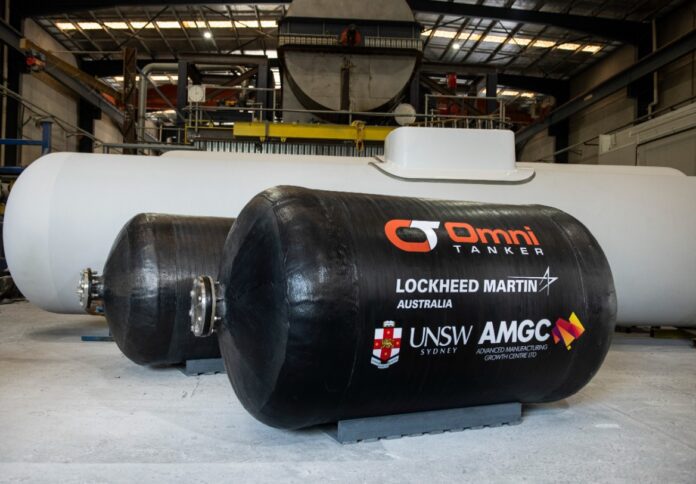
Australian composites manufacturer Omni Tanker, in partnership with Lockheed Martin and the University of New South Wales (UNSW), has successfully developed a solution for the transportation of cryogenic and liquid cargoes such as hydrogen and helium.
This two-year project, supported by the Advanced Manufacturing Growth Centre (AMGC), capitalises on Omni Tanker’s expertise in composite technologies utilised in its industrial transport portfolio, the organisation said in a media release.
Omni Tanker is renowned globally for manufacturing lightweight, composite road tankers for caustic materials, both locally and for export to Europe and North America from its Sydney base.
The partnership leveraged Omni Tanker’s composite capabilities and Lockheed Martin’s extensive aerospace experience, resulting in the creation of two innovative tanks: a Type 4, fluoropolymer-lined, carbon fibre composite tank, and a Type 5, liner-less, carbon fibre composite tank.
These tanks are designed to store and transport not only liquid hydrogen but also oxygen, hydrogen peroxide, and hydrazine at high pressures under extreme cryogenic temperatures.
The tanks underwent rigorous testing, meeting performance metrics, even when exposed to cryogenic temperatures as low as minus 269 degrees Celsius.
Following the success of the project, operational-scale demonstrator versions of these tanks for Lockheed Martin’s LM2100 satellite have been manufactured at Omni Tanker’s advanced facility in Sydney’s west.
Omni Tanker’s CEO and Founder, Dr. Daniel Rodgers, highlighted the transformative nature of the $1.59 million project, stating that it elevated the company’s capabilities to unprecedented levels.
“By leveraging Omni Tanker’s capabilities, we have been able to translate our composite road tanker technology to the global space sector – where performance, weight, and cost are of paramount importance”, said Rodgers.
Christopher Hess, Lockheed Martin Australia’s head of Industrial Development, underscored the company’s commitment to collaborating with industry partners like Omni Tanker to deliver world-leading space capabilities in a constantly evolving global strategic environment.
Dr Jens Goennemann, managing director of AMGC, praised Omni Tanker’s initiative in exploring opportunities beyond its current scope.
“With the assistance of AMGC, Omni Tanker has done what more manufacturers should do: seek ways to leverage their capabilities across adjacent opportunities, in this case moving from road tankers to spacecraft”, said Goennemann. It’s generally not rocket science – except in this case it is,” said Goennemann.
The project also identified a new application for Omni Tanker’s patented OmniBIND solution, utilising a nanoengineered additive product developed by UNSW.
This innovation prevented matrix cracks in pressure vessels storing liquefied hydrogen at extremely low temperatures.
UNSW’s Scientia Professor Chun Wang pointed out the collaborative efforts involved in transforming cutting-edge technology into practical commercial applications.
“As a result of extensive nano-engineering efforts, we now have composite structures that can withstand the extreme cold of liquid hydrogen without experiencing microcracking or hydrogen gas leak,” said Professor Wang.
Dr Luke Djukic, CTO at Omni Tanker, described the project as a significant step forward and a strategic leap in sovereign capability.
“These new material technologies are well-matched to the high-end pre-impregnated composite materials typically used in aerospace yet offer a more economical production method from materials that are readily available,” said Djukic.
The co-funded project, totalling $1.59 million, received a co-investment of $700,000 from AMGC, with in-kind contributions totalling $194,000.
For more details on the project, interested parties can visit this page.




















